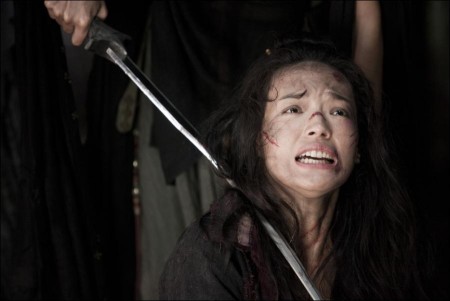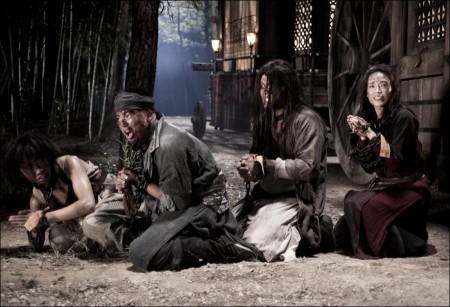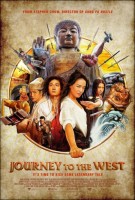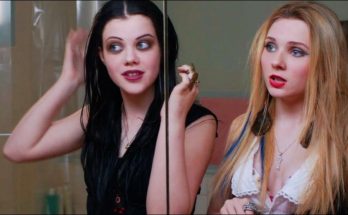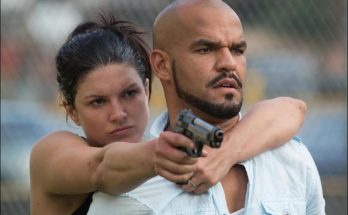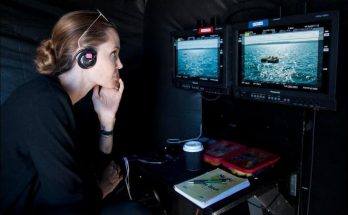Journey to the West is a French-Taiwanese film directed by Tsai Ming-liang. It had its world premiere at the Panorama section of the 64th Berlin International Film Festival on February 2014.
This is a world plagued by demons, who cause its human inhabitants unspeakable suffering. Young demon hunter Xuan Zang, fearlessly guided by his belief in “giving himself for the greater cause”, risks his all and conquers a water demon, a pig demon and the demon of all demons, Sun Wukong. He embraces them as his disciples, and melts them with love. Meanwhile, Xuan Zang discovers the true meaning of Greater Love himself. In order to atone for their own sins and save the common people, the four of them embark on a journey to the West that’s full of challenges…
Q & A with Stephen Chow
An Inside Look at Journey to the West
300 Nursery Rhymes is a very interesting invention. It’s supposed to be just a songbook for children. But it becomes a super-powerful demon-hunting tool in the film. How did you come up with the idea?
Since I was a kid, I’ve always liked singing nursery rhymes. I was also once a well-known TV host for children’s programs. Nursery rhymes are the love of my life. So they became part of the story. I wanted the demon-conquering stunt to be something cute and childish, and touching in the demons’ eyes. That’s how I thought of nursery rhymes.
There are some other powerful weapons in the film, like the Infinite Flying Rings. What inspired that?
The Infinite Flying Rings first appeared in the film Buddha’s Palm. Able to change flying direction mid-air, they were created as a weapon to counter the great Buddha’s Palm. But in the end, they were no match for Ten Thousand Dancing Buddhas – the ninth palm position in Buddha’s Palm. Even so, they’re still a very powerful weapon. I liked the idea a lot and borrowed it.
Everyone was looking forward to seeing your performance in Journey. But you’ve ended up not appearing in the film at all. Why did you choose to just direct and not act?
The main reason is that Journey is a very challenging project. I thought about it a lot. I needed to be 100% focused if I wanted to make a good film about this subject matter. I’ve tried directing and acting simultaneously several times before. But I felt that if I did that again, I wouldn’t be able to make a great film with this story. So in the end, I chose to give up acting and concentrate on making the best film I could.
In each and every one of your previous films, there are a lot of memorable lines. Is there any dialogue in Journey that’s special and that you’re particularly proud of?
There is lots of good dialogue in Journey. My favorite has to be “Forever is too long. Seize the moment.” It resonates with A Chinese Odyssey from more than ten years ago. At the same time, it’s also a new look at love.
It’s very impressive that you’ve always been able to blend love stories with humor in your films. Journey is no exception. People will inevitably compare the love relationship between Wen Zhang and Shu Qi’s characters to the one between Joker and Zixia. What do you think?
I think they are both touching stories, very tragic. Only tragic love stories can be touching. There’s nothing to write about a happy love story. Therefore they need to be tragic. Of course, because the actors have changed, what emerges on the screen is different too. But the touching part remains the same. I personally think that Journey is more touching.
Q & A with the Gang of Demon Hunters
How did Stephen Chow find you?
Wen Zhang: At first, Mr. Bill Kong called me. I was in Singapore for business when he called. He wanted me to find time to fly to HK and meet with Mr. Chow. I heard that he was going to make a film. So I thought maybe he was casting for it. But I had no idea why he wanted to see me. And when we met in Hong Kong, we were just chitchatting. He asked if I had any friends in Hong Kong, whether I was eating well and getting enough sleep, what I was planning to do and whether I had watched and liked A Chinese Odyssey. I didn’t hear from him for a long time. Maybe a month before shooting started, he sent me the script and asked me to read it. I didn’t know which role I would play until days before we started shooting. And the next time I saw him was in Heng Dian.
Huang Bo: I turned it down at first, because I felt that Stephen Chow’s Monkey King was already so deeply entrenched in the audience’s memory. Everyone loved that Monkey King, and it would be very challenging for anybody to take on the role again. Also people would inevitably compare your performance to that of the previous Monkey King, which would be limiting, I thought. But in the end, Mr. Chow tricked me into doing it (laughs). He asked me how I would reprise the role and I shared my thoughts with him. He then told me, “Good ideas. Better than mine. Come and just act in the way you described.” And there I was.
Stephen Chow’s films never follow the rules. What was it like working with him?
Shu Qi: You can go wild and crazy with your role in a Stephen Chow film. So in Journey, I tried to act in an exaggeratingly comedic way for the first time. Like when you walk into a forest and boom, a monster jumps out at you. You need to be ready, and fight it. It’s really satisfying.
Stephen would demonstrate how to act for each scene. So when we were shooting, I’d watch him perform first before I did it. It feels like you saw it first. Whatever you need to do, you’ve seen in the theater already, but it’s someone that you (the audience) won’t get to see. Wow!
Wen Zhang: Xuan Zang is a heavy-duty role. He’s in almost every scene. I found the script very interesting, tears and laughter in one role. At first, I couldn’t find the “right” performance. By “right”, I mean the style of comedy of a Stephen Chow film. It was very hard to hit the mark at the beginning. The first week of shooting was torture. I spent a lot of time talking to Mr. Chow about the character and how to find ways to make it funnier. He would help me sort out various ways to interpret the character. So I think Mr. Chow is really a master of comedy. He gives actors a lot of space. If this were the same Xuan Zang as Master Law Kar Ying’s, he wouldn’t have come to me.
Huang Bo: Stephen Chow is a legend! As an actor, I never imagined that I would be working with Stephen someday. Once you talk to him, you realize he’s a very intelligent person. As a comedy actor, or rather a comedy director now, he’s brimming with humor, which is really important. I feel very privileged to have had this opportunity to work with him. I learned a lot from him as a filmmaker too. He has extremely high standards for everything and won’t just settle for the easy solution. He’s always trying to create something better. The character Sun Wukong, for example, was supposed to have been locked in the cave for 500 years. So he had to look like it — bald, old and pale.
What was it like to work with Shu Qi?
Stephen Chow: I saw the power that lies beneath her beauty and sex appeal. It’s power, not violence. And those martial arts skills! I have a good eye for talent, don’t I? I can often see what other people don’t. I’ve known for a long time that Shu Qi has it in her. So I asked her to play Miss Duan.
Wen Zhang: The way she looks and dresses is very feminine. But deep down, she has a lot of masculine qualities. You would probably imagine that she’s pretty, elegant and graceful all the time. But when you see her in person, she’s actually pretty casual. She would show up to the set in baggy pants, a white t-shirt and flip-flops. Sometime holding a cup of coffee, sometimes a piece of corn, very casual in general. When she speaks, it’s very loud and clear too. Anyway, it’s completely different from what I had imagined. Because when you see her on the big screen, like in If You Are Not the One, she’s feminine, lovely and cute. But in real life, completely the opposite, very much like a guy.
Huang Bo: It’s my first time acting alongside Shu Qi. I feel like there’s nothing she can’t do as an actress. She can play cute, silly, feminine and delicate, anything. I think our acting is very different this time. The script is different from a creative perspective. So are the tempo and style. Of course, it’s still uniquely Stephen Chow. If there’s one thing that’s the same, it’s the humor, and the excitement.
What do you think of Wen Zhang?
Shu Qi: Just a year and a half ago, I still thought of him as a newcomer. I had only seen him in Ocean Heaven. So I really thought he was autistic or something. But when we were shooting Journey, I found out that he’s smart as hell. He’s also a great comedic talent. He can sing, he can dance, direct, act, you name it. I really admire Wen Zhang. He is so talented at such a young age. More importantly, he’s married already and has a kid and a happy family. I am really envious.
Huang Bo: Wen Zhang is an extremely smart guy, smart actor. He’s very good at acting. He was able to quickly adapt for this film. The character is very different from what he had done before. I think it’s talent, it’s acting skill. He is a brilliant actor. I haven’t seen him in a comedy before. For this film, he’s delivered a completely different Xuan Zang.
What was it like working with Huang Bo?
Shu Qi: When Huang Bo showed up, you could immediately tell he’s no regular guy. When he stands in front you, you feel surprised and impressed. He’s been through a lot. And after Lost in Thailand, he’s even more “lost”. So every time we meet, we always have a good laugh together.
Wen Zhang: Huang Bo has his own very unique style of comedy. The general public loves that grassroots feel. We like to do lowbrow stuff, contemporary and colloquial. It’s easier for young people to relate to. Tongue-in-cheek and humorous.
There’s a scene in the film where you sing Love of A Lifetime. Can you please tell us what it was like filming that scene, and how do you like it?
Shu Qi: It felt like the entire world was watching me singing and dancing on top of a hill. I don’t know how to describe it in words. It really felt like dancing on a hilltop. The stage was very small. It could hold two or three people at most. I had to do the Chow style sexy dance like I was really into it, and the crew was watching me. It felt like a real dance performance. And because we were shooting in the middle of nowhere, it also felt like we were in ancient times. When you stand on an elevated stage and a big spotlight is shining on you, it’s very awkward to have to dance in front of the crew. After all, I’m not a dancer by training. And on top of that, I had to sing too. So when you go into the cinema, please bring earplugs. When it gets to that part, please cover your ears.
Q & A About the Post Production and Special Effects
Can you please tell us about the computer-generated demons?
Ken Law (Visual Effects Supervisor): The Sand Monk was reincarnated as the well-known fish demon. But Mr. Chow didn’t want it to be 100% fish or entirely alien, like the creature in Host. He wanted to add some uniquely Chinese features to it, referencing the monsters in The Classic of Mountains and Seas. In the end, the fish demon we created has a tiger’s head and also horse feet on its belly.
There are a few different looks for the pig demon. He was known to be an ugly beast. After being killed by his cheating wife and her paramour, he likes to mask himself with a handsome guy’s face. Later on, after Miss Duan defeats him, we see the true demon in him, which has quite a surprising look.
As for the Buddha — the story wants to convey the message that he’s everywhere. Xuan Zang tries to explain to Wukong that even though he’s escaped his imprisonment in the cave, he’s still under the control of the Buddha. Therefore, we have several “incarnations” for the Buddha too.
Stephen Chow: There hasn’t been any Chinese film before Journey that’s had really cool CG demons. What you’ll see this time is that we’ve put a lot of efforts for into creating our demons. So the audience will feel like it’s something they haven’t seen before.
Sun Wukong is an ever-changing character, an embodiment of the imagination. He has a shape-shifting power known as the “72 transformations”. So he can be anything he wants to be. In our story, he appears in many shapes and forms. Huang Bo only plays one form of Sun Wukong. We had a few other actors for Wukong too. Some are not even actors; for example, there’s a beast. He can be a monkey, or a big King Kong. That’s how versatile he is.
What were the director’s requirements for post-production?
Angie Lam (Post-production Supervisor): “Realness” was what he required from the special effects department. For example, for that transition from outer space to the earth at the end of the film, we had to watch a lot of sci-fi movies. We even called the science museum. The SFX supervisor joked about asking NASA for help. Mr. Chow likes eating fish. So it comes as no surprise that the fish demon feels so real. “To do anything well, you really need to focus and do it diligently.” That’s a line from The God of Cookery. For any seemingly small change he made, there was a lot of research behind it. Every time I traveled with him, I noticed a few thick books in his bag.
Ken Law: Mr. Chow had his own vision for the special effects. Generally he would start by telling us about the concept or vision he had in mind. We would then try a few different things he had suggested, and he would pick the most suitable ones. He liked to scout the sets too, so that he could connect the actors, the sets and the props with the special effects. Sometimes what we pre-visualized on the computer was not ideal for a set. He was able to make changes to the plan before shooting.
There are a total of 880 CG shots in the film. We had over thirty people working in Hong Kong and 60 more in Korea. It took us more than a year to finish post-production. Our team in Korea also hired some special effects specialists from Hollywood.
Can you please tell us what’s special about the 3D effects in Journey?
Stephen Chow: There’s nothing special about the 3D effects in Journey. It’s been converted to 3D in post. If you compare it to other 2D to 3D conversions, I think we’ve done a good job with Journey. I’m very happy with what we’ve able to achieve. I’ve seen some terrible 3D films. They made me wonder whether there’s a need for 3D. Honestly speaking, personally, I’m not a fan of 3D. But for some of the scenes in Journey, 3D really has created a different look. Now I’m starting to feel more positive about 3D in general.
What are our biggest advantages, compared to Hollywood, in making fantasy films?
Stephen Chow: It takes a lot of resources, including time and money, to make fantasy films. Hollywood is the most advanced in that regard. After all, they have the biggest film market. But we have our own strengths too. We don’t need to compete with them for these resources. We have “imagination and creativity”. Imagination and creativity first, and then the resources to bring them to reality. To me, it’s really a matter of imagination. I don’t think we are any less creative than Hollywood.
Journey to the West
Directed by: Chi-kin Kwok, Stephen Chow
Starring: Qi Shu, Stephen Chow, Chrissie Chow, Zhang Wen, Bo Huang
Screenplay by: Stephen Chow, Chi-kin Kwok
Production Design by: Bruce Yu
Cinematography by: Sung Fai Choi
Film Editing by: Chi Wai Chan
Costume Design by: Pik Kwan Lee
Music by: Ying-Wah Wong
MPAA Rating: PG-13 for fantasy violence including bloody images, some sexual content and partial nudity.
Studio: Magnolia Pictures
Release Date: March 7, 2014
Visits: 78
